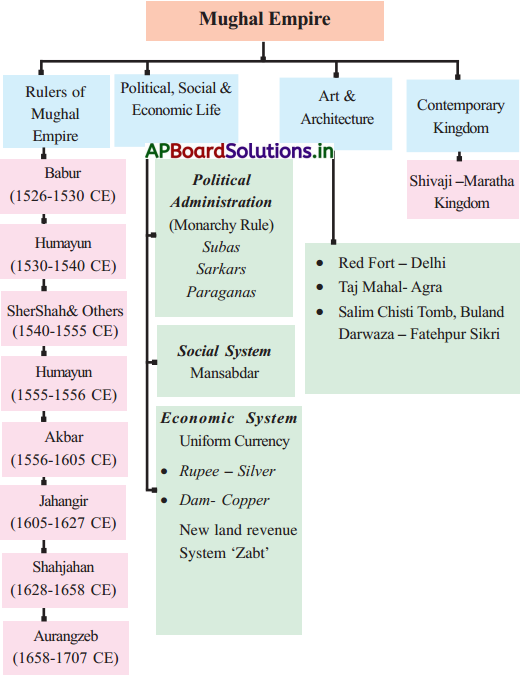Students can go through AP Board 7th Class Social Notes 7th Lesson Mughal Empire to understand and remember the concept easily.
AP Board 7th Class Social Notes 7th Lesson Mughal Empire
→ Red Fort was built by Shahjahan.
→ The Rise of the Mughals has brought a great change in medieval Indian History.
→ Babur established Mughal Empire after during Ibrahim Lodi the last ruler of Delhi Sultanate at Panipat in 1526 CE.
→ Babur’s son Humayun came to throne after Babur, but Humayun’s brothers did not help him at the right time.
→ Shershah Sur was an Afghan leader.
→ Shershah was not only a great warrior but also an administrator.
![]()
→ Many Rajputs surrendered to Akbar and married of their daughters.
→ Salim the successor of Akbar came to the throne with the title Jahangir.
→ Shajahan’s period was much known for the construction of buildings.
→ Aurangzeb was a devout Muslim and led his life as per the principles of Quran.
→ The Mughals had a centralised administration.
→ Akbar introduced the Mansabdari system in his military policy.
→ Mughals are Sunni Muslims.
→ The Mughals were responsible for building an extensive road system, creation of uniform currency, and the unification of the country.
→ Indian Agricultural production increased under the Mughal Empire.
→ The textile industry developed in the Mughal Empire.
→ A new tradition of architecture was started during the Mughal era.
![]()
→ Persian language was the dominant and official language of the empire.
→ A new school of art known as miniature painting emerged during the Mughal period.
→ The decline of Mughal Empire started with Shahjahan and ended with Aurangzeb.
→ The contemporary rulers during Mughals were Afghans, Rajputs, Marathas and Bahman kings.
→ Shivaji was the founder of the Maratha kingdom.
→ Though Shivaji was a devout Hindu, he respected other religions.
→ Shivaji developed naval force.
→ In Shivaji’s administration, to assist him ‘Ashta Pradhans1 are there (Eight Ministers).
→ Rulers of Mughal Empire : The Mughal emperors built and ruled the Mughal Empire on the Indian Subcontinent.
→ Political, Social and Economic life
Political life : The Mughals had a centralised administration.
→ Social life : Mughals are Sunni Muslims.
→ Economic life : The Indian Economy prospered under the Mughal Empire.
→ Art and Architecture : A new tradition of architecture was started during the Mughal era.
→ Contemporary Kingdom to Mughal empire : Happening, existing, living or coming into being during the same period of time.
→ Warrior : a brave or experienced soldier or fighter.
→ Regent : a person appointed to administer a state because the monarch is a minor or is absent or incapacitated.
![]()
→ Heretic : a person believing in or practicing religious heresy.
→ Guerrilla warfare : a surprise attack of hit and run tactic by a group of soldiers.
→ Agrarian : relating to the ownership and use of farmland.
